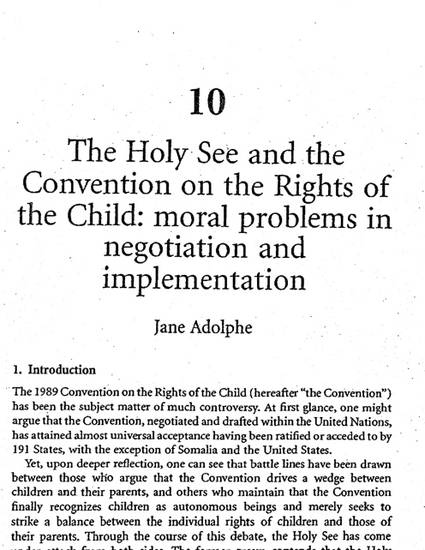
Contribution to Book
The Holy See and Convention on the Rights of the Child: Moral Problems in Negotiation and Implementation
Cooperation Complicity and Conscience: Moral Problems in Healthcare, Science, Law, and Public Policy
(2005)
Abstract
The 1989 Convention on the Rights of the Child (hereafter "the Convention") has been the subject matter of much controversy. At first glance, one might argue that the Convention, negotiated and drafted within the United Nations, has attained almost universal acceptance having been ratified or acceded to by 191 States, with the exception of Somalia and the United States.
Yet, upon deeper reflection, one can see that battle lines have been drawn between those who argue that the Convention drives a wedge between children and their parents, and others who maintain that the Convention finally recognizes children as autonomous beings and merely seeks to strike a balance between the individual rights of children and those of their parents. Through the course of this debate, the Holy See has come under attack from both sides. The former group contends that the Holy See should not have ratified the Convention, while the latter argues that the Holy See in ratifying but entering (what are known in international law as) reservations, failed to treat the child as an autonomous being.
Disciplines
Publication Date
2005
Editor
H. Watt
Publisher
Linacre Center
Citation Information
Adolphe. Jane F. "The Holy See and Convention on the Rights of the Child: Moral Problems in Negotiation and Implementation." In Cooperation Complicity and Conscience: Moral Problems in Healthcare, Science, Law, and Public Policy, edited by H. Watt. London: Linacre Center, 2005, available at https://works.bepress.com/ProfessorJaneAdolphe/30/.
